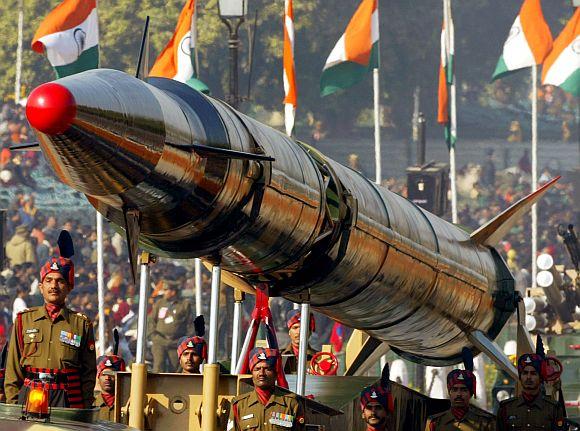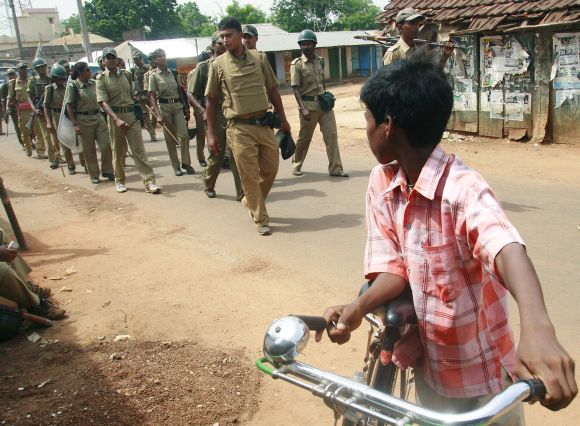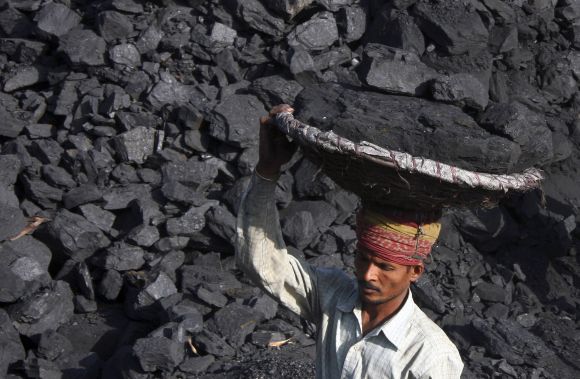Photographs: B Mathur/Reuters
Despite "impressive" achievements in various sectors in recent years, India is unlikely to be a superpower and in fact, should not aspire to become one, a study by the prestigious London School of Economics has concluded.
The study, titled 'India: The Next Superpower?', recalls and dismisses US Secretary of State Hillary Clinton's statement made during her visit to India in 2009 that "I consider India not just a regional power, but a global power".
The LSE study comprising essays by nine experts in the areas of India's economy, defence, government, culture, environment and society advises "caution in assessing India's claim to superpower status".
...
'India still faces major developmental challenges'
Image: A village boy watches police patrolling a road as they move towards Maoist-infested Lalgarh in West BengalPhotographs: Jayanta Shaw/Reuters
Ramachandra Guha, currently the Philippe Roman Chair in History and International Affairs at the LSE, argues that it is doubtful whether India should seek to become a superpower.
He cites seven reasons why India will not become a superpower.
These are: "The challenge of the Naxalites; the insidious presence of the Hindutvawadis; the degradation of the once liberal and upright Centre; the increasing gap between the rich and the po#8744 the trivialisation of the media; the unsustainability, in an environmental sense, of present patterns of resource consumption; the instability and policy incoherence caused by multi-party coalition governments", he writes.
Listing India's several achievements that prompted predictions and ambitions in some quarters about India being the next superpower, the study goes on to discuss several challenges that are likely to prevent India from realising such ambitions.
It says: "Still, for all India's success, its undoubted importance and despite its undisputed potential, there is cause for caution in assessing India's claim to superpower status.
"India still faces major developmental challenges. The still-entrenched divisions of caste structure are being compounded by the emergence of new inequalities of wealth stemming from India's economic success".
'Economic success at environment's cost that is unsustainable'
Image: A labourer carries coal in a basket to load it in a truck at a coal store in ChandigarhPhotographs: Ajay Verma/Reuters
The study adds: "India's democracy may have thrived in a manner that few ever expected, but its institutions face profound challenges from embedded nepotism and corruption.
"India's economic success continues to come with an environmental cost that is unsustainable".
Moreover, the study says that India has pressing security preoccupations, but sees the country continuing to play a constructive international role in, among other things, the financial diplomacy of the G20.
"(It) certainly has a soft-power story to tell as a model of liberal political and economic development.
"Perhaps even more significantly, the cultural impact of Indian cuisine, literature, films, music and sporting events will increasingly be felt globally through and beyond India's vast diaspora", the study says.
It adds: "Yet the hopes of those in the West who would build up India as a democratic counterweight to Chinese superpower are unlikely to be realised anytime soon".
Besides Guha, other contributors to the study are Rajeev Sibal, Iskander Rehman, Nicolas Blarel, Oliver Stuenkel, Harish Wankhede, Mukulika Banerjee, Andrew Sanchez and Sandeep Sengupta.




article